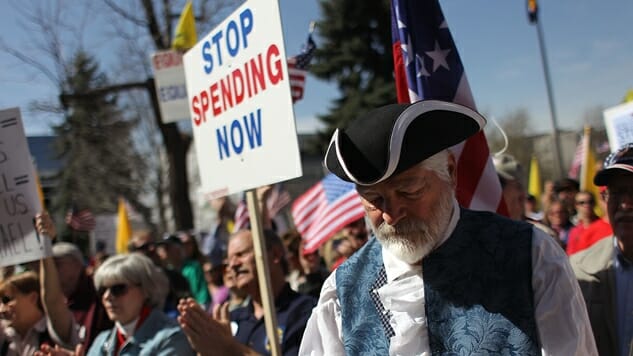Peaceful Protests and Partisan Hypocrisy
Photo by John Moore/Getty
Shortly into former President Obama’s first term in office, the nation witnessed the rise of a fervent grassroots movement known as the Tea Party. Fiscal conservatives, concerned about the new president’s trillion-dollar stimulus package, corporate bailouts, and plans for a government-heavy health care overhaul, made their opposition heard loud and clear. They marched in local parades, in front of state capitols, and across Washington, protesting what they saw as unsustainable government overreach.
Neither of the major political parties initially knew what to make of the movement, but the size and tenacity of the crowds didn’t go unnoticed. Republican politicians (some reluctantly) attempted to harness the sentiment of the demonstrations, while Democrats and much of the mainstream media portrayed the protesters as anti-government nut-jobs who were deserving only of mockery.
To be fair, some members of the Tea Party invited the jokes upon themselves—arriving at rallies dressed as colonial patriots and town criers—and reading their declarations of opposition off of parchment scrolls. But as national polling going into the 2010 midterm election revealed some serious political momentum behind the discontent, the American Left took on a much sharper tone.
Media organizations worked hard to portray the movement as being motivated not by Obama’s policies and ideology, but by the color of his skin. The politically incorrect optics of prominently white crowds were presented as evidence of such.
Journalists made it a habit to wade through the peaceful protests to find an offensive sign or an unsavory individual for which to direct their cameras at. Some hard-news reporters even engaged in on-air shouting matches with protesters in an attempt discredit and marginalize their views.
Democratic politicians, who had been declaring dissent as the highest form of patriotism during the Bush years, were suddenly framing dissent as bigotry. Some even waged elaborate stunts (like guiding members of Congress through the protests) in hopes of generating news-clips from which to substantiate that narrative.
Meanwhile, the conservative movement (and the conservative media in particular) championed the Tea Party, declaring its members to be patriots who were exercising their freedom of speech and speaking truth to power.